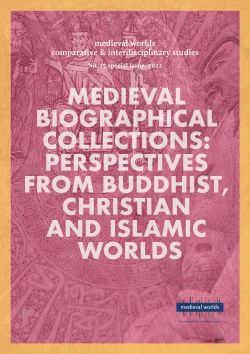Daniel Mahoney
S. 175 - 194
doi:
10.1553/medievalworlds_no15si_2022s175
Verlag der Österreichischen Akademie der Wissenschaften
doi:
10.1553/medievalworlds_no15si_2022s175
Abstract:
Al-ʿUqūd al-lu ̉lu ̉iyya fī ta ̉rīkh al-dawla al-Rasūliyya, a chronicle describing the events surrounding the lives of seven Rasūlid sultans as they strove for dominance over the inhabitants of South Arabia, was completed shortly after the death of the last of these rulers, al-Ashraf Ismāʿīl, by court historian Abū al-Ḥasan ʿAlī al-Khazrajī. It aimed to depict the potency of the sultans’ divinely guided rulership after a period of time during which the sultanate’s territory and influence had decreased. As a result, it comprised idealised chronographical reports based on earlier works of Rasūlid historiography as well as end-of-year obituaries that depicted the lives of notable individuals who were part of the political community over which the sultan ruled. This article first looks at how the relationship between al-Khazrajī and al-Ashraf Ismāʿīl affected the production of al-ʿUqūd as well as how earlier biographical collections in Yemen laid the groundwork both in content and political perspective for the work’s own unique presentation in chronicle format. Then it examines the formulaic content of many of the obituaries as they follow along similar modes of presentation according to frequently occurring types of individuals, such as religio-legal specialists or military administrators. Finally, it shows how the obituaries change during the chronicle’s depiction of the reign of al-Ashraf Ismāʿīl, which ultimately reveal a more personal side of his rulership at the end of the 8th/14th century.
Rasūlid, Yemen, Islamic world, political history, historiography, biography
Published Online:
2022/06/08 10:21:00
Object Identifier:
0xc1aa5576 0x003d78a7
Rights:https://creativecommons.org/licenses/by-nd/4.0/
medieval worlds provides a forum for comparative, interdisciplinary and transcultural studies of the Middle Ages. Its aim is to overcome disciplinary boundaries, regional limits and national research traditions in Medieval Studies, to open up new spaces for discussion, and to help developing global perspectives. We focus on the period from c. 400 to 1500 CE but do not stick to rigid periodization.
medieval worlds is open to submissions of broadly comparative studies and matters of global interest, whether in single articles, companion papers, smaller clusters, or special issues on a subject of global/comparative history. We particularly invite studies of wide-ranging connectivity or comparison between different world regions.
Apart from research articles, medieval worlds publishes ongoing debates and project and conference reports on comparative medieval research.
Medieval Biographical Collections: Perspectives from Buddhist, Christian and Islamic Worlds
Guest editors: Daniel Mahoney, Diarmuid Ó Riain and Giorgia Vocino
Editorial
Walter Pohl and Ingrid Hartl
Introduction
Medieval Biographical Collections in Comparison
Daniel Mahoney and Giorgia Vocino
Introductory Comparative Chapters
Compilation Strategies
Daniel Mahoney and Diarmuid Ó Riain
Writing Strategies
Reinier Langelaar, Giorgia Vocino and Veronika Wieser
Audience and Reception
Rutger Kramer and Graeme Ward
Case Studies
Many Lives, One Story: The Gesta Sanctorum Rotonensium and the Making of Redon
Rutger Kramer
Biography and Hierarchy: The Tibetan Ruling House of Phag-mo-gru and the Singular Volume of the Rlangs (Rlangs-kyi-po-ti-bse-ru)
Reinier Langelaar
Reading Jerome’s De viris illustribus in the Post-Roman World: Cataloguing Community in Gennadius of Marseille and Frechulf of Lisieux
Graeme Ward and Veronika Wieser
Shaping Community through Biographical Collections from South Arabia: A Comparison of Two Ṭabaqāt-works
Johann Heiss
Compiling the Deeds of Salzburg Saints: The 12th-Century De episcopis Salisburgensibus and the Monastery of Admont
Diarmuid Ó Riain
Obituaries in Service of the Rasūlid Sultanate in Yemen at the Turn of the 9th/15th Century
Daniel Mahoney
Creating a Sense of Glorious Destiny. Mastery of Speech in the Libellus de Situ Civitatis Mediolani (Late 10th-Early 11th Centuries)
Giorgia Vocino
Conclusion
Communities and Contexts: Concluding Thoughts on Medieval Biographical Collections
Diarmuid Ó Riain




 Home
Home Print
Print
 References
References
 Share
Share
